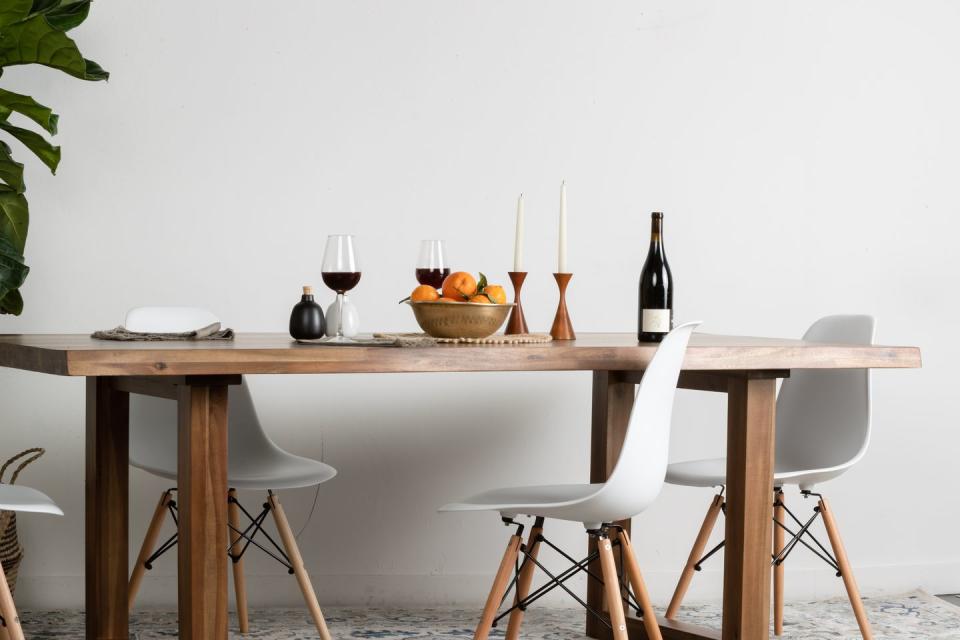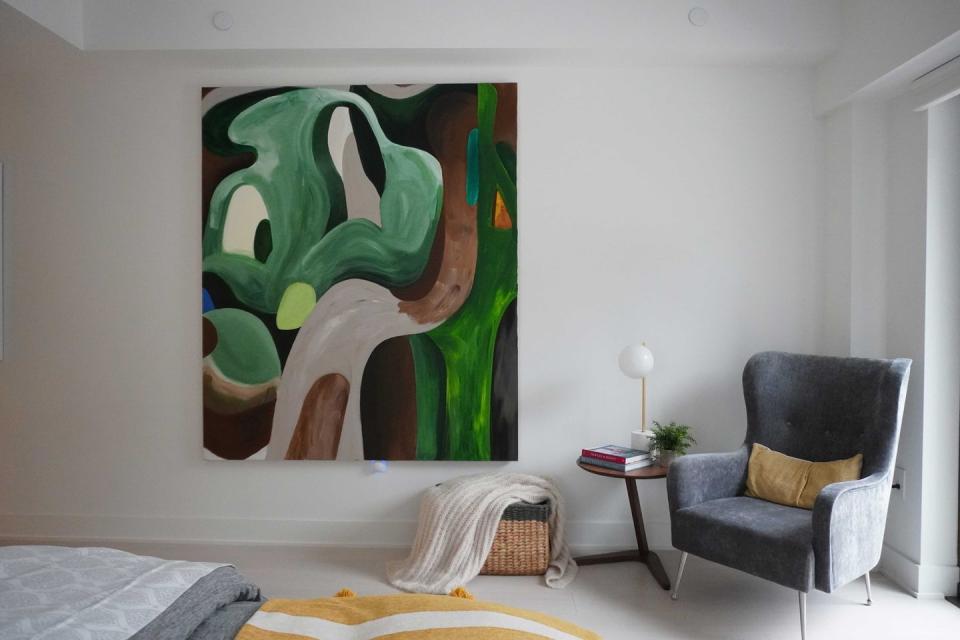When the World Is Too Uncertain to Commit to a Couch, Rent One Instead

Many of us have a love-hate relationship with our homes these days. We’ve been spending a lot of time with household objects, using our desks and sofas more than ever before, and hanging art to brighten these dark days. And many of us are also getting antsy: According to a Pew Research Center study published in July, more Americans have relocated this year than in all of 2019. We’ve moved away from big cities or into them, sought solace in family in other regions, hopped Airbnbs to get a taste of life in new places, and moved in with partners, perhaps a bit too quickly. Some of the changes feel long-lasting, others based on circumstance, but either way, we still need a place to lay our head every night.
In 2020, home is all we’ve got, but it’s never felt more ephemeral. So what becomes of our armoires and bed frames if we skip town? The solution, increasingly, is a burgeoning niche of furniture and art rental platforms that are paving the way for the end of material ownership once and for all. They are equipped with chic names meant to evoke lightness and effortless vibes, like furniture rental platforms Fernish and Feather, or Curina, an art rental website. Each offers gorgeous, expensive-looking furniture with zero commitment.

After clothing (Rent the Runway), cars (Zipcar, Lyft), and cultural assets (Spotify, Netflix, you name it), the home goods market is one of the next industries ripe for disruption as consumers move away from the concept of the “forever home.” Instead of settling down in a house and intending to grow old in it, surrounding oneself with sturdy, expensive furniture, increasingly dwellers are looking to have a more casual relationship with their home goods.
In addition to Feather and Fernish, which launched in 2017, and Curina, operating since 2019, the growing niche of furniture rental companies includes Oliver Space and the Everset, both of which also launched last year. The premise is simple: instead of purchasing a sofa or a painting, you rent them, for monthly installments. (They start at $8/month for a single dining chair, and go up to $79 for bigger items like sofas.) Some of the platforms require a three month minimum commitment, while others allow users to rent items for as little as a month. Tired of the piece or heading somewhere new? The companies will send a team to pick it up, no Craigslisting required. And if you fall in love with the item, the monthly installments accrue toward the full purchase price.

“With COVID-19, people are realizing that, you know, life happens, and that their furniture is more of a commitment than almost anything else—physically and financially—you're tied down to these items,” says Gavin Steingerg, the CEO of The Everset, a year-old platform based in New York. “If you don't know where you're going to be living and what the world will look like in 12 months, the idea of buying furniture and putting money and effort into it doesn’t make sense.” About a third of subscribers end up purchasing items, Steinberg says, while the rest move on without them.
Emily Simmons, head of brand at Oliver Space, a San Francisco-based furniture rental service that launched in 2019, has also seen a pandemic uptick. “With COVID-19, we've seen a tailwind obviously, as people are thinking a little bit differently about their home,” Simmons says. “Now that we got rid of social gatherings, your home is your main way to express yourself, for yourself.” The company, which recently expanded to Los Angeles, experienced a 400 percent spike in new orders between March and July.

Not wanting to be tied down is what prompted Oakland creatives Jimmy Brower and Damien Merino to sign up for Feather in 2019. The couple is currently renting a credenza and a side table, and recently swapped out one couch for another from Oliver Space for their loft. “It’s a great way to update your space whenever you want,” Merino says. It also made their recent move from the Bay Area to southern California a breeze. “We liked the idea that we could swap out whenever we wanted and that if we spill something on the couch it’s not a big deal.” (The platforms have insurance policies to cover wear and tear.)
For Seattle-based author Moorea Seal, the flexibility offered by furniture rental companies was key when she was going through a divorce recently. In February, she found herself scrambling for new housing while her city was locked down. Rather than commit to a year-long lease when nothing was certain, she opted for a short-term rental furnished with items from Fernish. Three months later, she left her temporary home and furniture behind to embark on a road trip with no end date, a decision she credits, in part, to the “eye-opening” experience she had with Fernish. “I was able to see that I can live more nomadically,” Seal says.

One especially popular room to renovate this year is, unsurprisingly, the home office. “We’ve seen a 315 percent jump in home office rentals, desks in particular” says Michael Barlow, the co-founder and CEO of Fernish, which operates in greater L.A and Seattle. Customers, who primarily range from ages 24 to 34, prefer to rent, he says, “because there's hesitance: how long do you need this for? No one can be sure.”
Many users have also opted to freshen up drab walls in living rooms and even bedrooms as the formerly private spaces are now open to scrutiny from coworkers on endless Zoom calls. “People are conscious of how their home looks and what they have on their walls when they are on Zoom,” says Mio Asatani, founder of Curina, an art rental platform, she launched in 2019. “But there’s a lot of uncertainty—people don’t know if they’ll be working remotely for long, or if they might move to the suburbs—so they want a risk-free way to enjoy artwork and make their life at home richer.” About 60 percent of customers end up purchasing the artwork, Asatani adds.

Andrew Githenes, along with his wife Kristen Rafeal, rented three paintings by Brooklyn artist Evan Ishmael from Curina just before COVID-19 locked them in perpetual WFH hell. “The paintings hang right above the couch, and are a nice conversation piece,” says Githens. “When everyone’s stuck behind screens on conference calls, the more you can inject personality and humanity into what otherwise would have been a dull call, the better.”
The couple moved to New York from Texas three years ago, but has never been sure how long they’d stay. “When you don’t know what your next home is going to look like, it makes it hard to commit to a piece of art,” Rafael adds. They had the art installed by Ishmael himself, and say while they love the paintings, if they moved and weren’t able to find a suitable wall for the pieces in their new home, “we’d probably switch them to something else.” Good thing that with these companies, one’s love for any particular piece need only last as long as the rental agreement.
You Might Also Like

